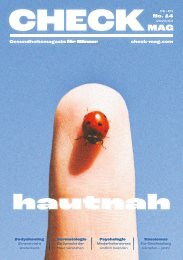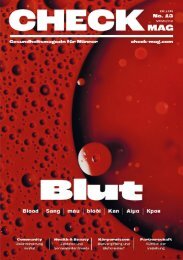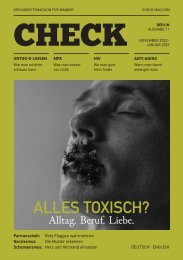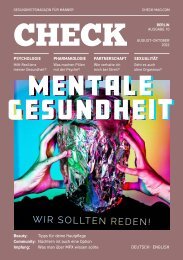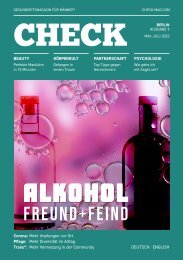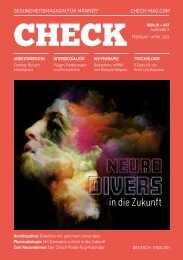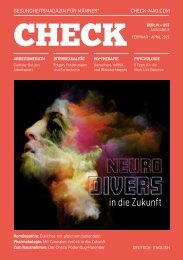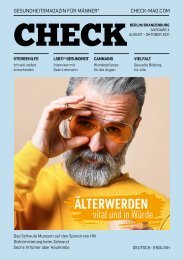CHECK Magazin - Gesundheitsmagazin für Männer No.4
Die Verschmutzung des Planeten findet aber auch im Kleinen statt und betrifft uns ganz direkt. Denn täglich nehmen wir unzählige Gifte durch die Nahrung, Kosmetik oder Alltagsgegenstände in uns auf. Welches sind die größten Gefahren und wie kann man sich im Alltag davor schützen?
Die Verschmutzung des Planeten findet aber auch im Kleinen statt und betrifft uns ganz direkt. Denn täglich nehmen wir unzählige Gifte durch die Nahrung, Kosmetik oder Alltagsgegenstände in uns auf. Welches sind die größten Gefahren und wie kann man sich im Alltag davor schützen?
Erfolgreiche ePaper selbst erstellen
Machen Sie aus Ihren PDF Publikationen ein blätterbares Flipbook mit unserer einzigartigen Google optimierten e-Paper Software.
ENGLISH<br />
HIV<br />
LIVE POSITIVELY<br />
Thanks to modern drugs, people<br />
with HIV are no longer infectious<br />
Photo: private<br />
Holger Rovini, doctor and<br />
medical director at ViiV<br />
Healthcare Germany<br />
Around 88,000 people currently live with HIV in Germany. Nowadays, thanks to<br />
modern drugs, they lead a normal life. If the therapy is successful, their viral load is<br />
below the detectable limit, then they are no longer at risk of passing on the disease--<br />
undetectable means untransmittable. Even so, people with HIV are often limited to<br />
their diagnosis, stigmatized and discriminated against.<br />
Mr. Rovini, are people with HIV really no longer<br />
infectious these days?<br />
Indeed, with successful therapy, people with<br />
HIV are no longer infectious. The primary aim<br />
of treatment is to permanently lower the viral<br />
load below the detection limit. The viral load<br />
is the amount of virus in the blood. With modern<br />
drugs you can lower it to a point that the<br />
viruses can no longer be detected in a blood<br />
test and therefore no longer be transmitted<br />
to others. This was first postulated in 2008<br />
with the so-called „Swiss Statement“ and has<br />
been shown in several large studies since<br />
2011. It was later also reflected in the EACS<br />
(European AIDS Clinical Society) guidelines<br />
and elsewhere: The principle U=U (undetectable<br />
= untransmittable). This means that<br />
HIV-positive people could have unprotected<br />
sex even without the risk of transmission.<br />
Does HIV then still play a role in the life of an<br />
HIV positive person?<br />
Even if an HIV diagnosis can be an emotional<br />
experience, it only accounts for a small part<br />
of a person‘s everyday life in the long term.<br />
Life expectancy in Western Europe for those<br />
with HIV is close to that of people without<br />
HIV. Of course, the medication must be taken<br />
consistently and there are regular check-ups<br />
with the doctor. The aim is for HIV to become<br />
as small a part of life as possible. We would<br />
like to offer the optimal therapy for every HIVpositive<br />
person.<br />
So there are various HIV therapies?<br />
Everyone has different needs and many<br />
different drugs are available these days. If HIV<br />
therapy is individually adapted to these needs,<br />
it can have a decisive influence on the longterm<br />
quality of life for people with HIV.<br />
Why are HIV-positive people still discriminated<br />
against when they can live well with HIV<br />
and are no longer infectious?<br />
Unfortunately, HIV is still a taboo subject. As<br />
a result, there is little coverage of it in the<br />
media, so that the success story of modern<br />
HIV therapy is only slowly spreading. In the<br />
meantime, it is no longer the virus itself that<br />
people suffer from, but above all the prejudice<br />
and discrimination that are brought against<br />
them based on the diagnosis. Today‘s life with<br />
HIV is very different from what most people<br />
think. Our current campaign #HIVersity aims<br />
to show just that. The different lives and needs<br />
of people with HIV are incredibly diverse - so<br />
they are much more than just HIV positive. At<br />
the same time, #HIVersity also alludes to the<br />
diverse treatment options. For people living<br />
with HIV, in order to maintain their quality of<br />
life, it makes sense to regularly check with<br />
their doctor to see whether their therapy is<br />
still optimally suited to their circumstances.<br />
Further information at<br />
www.livlife.de<br />
82 <strong>CHECK</strong> | AUSGABE 4









